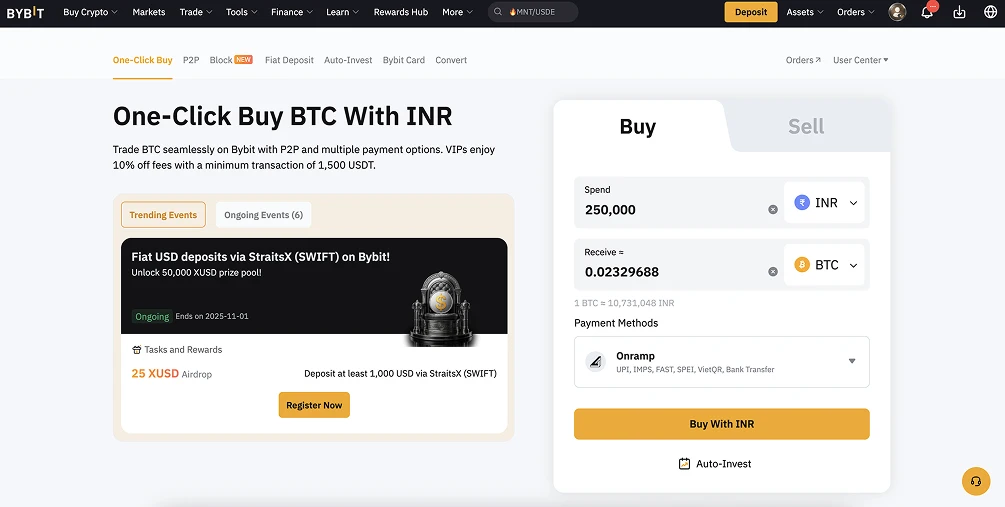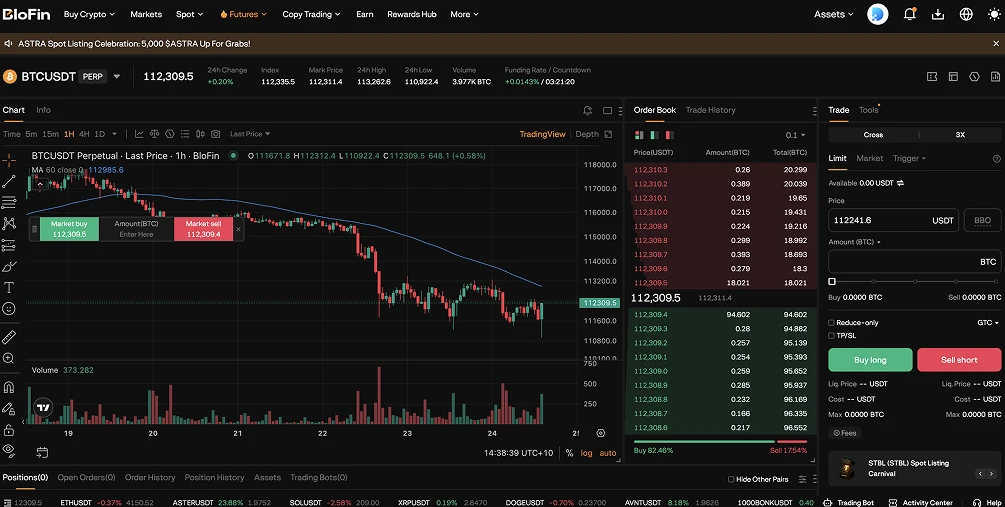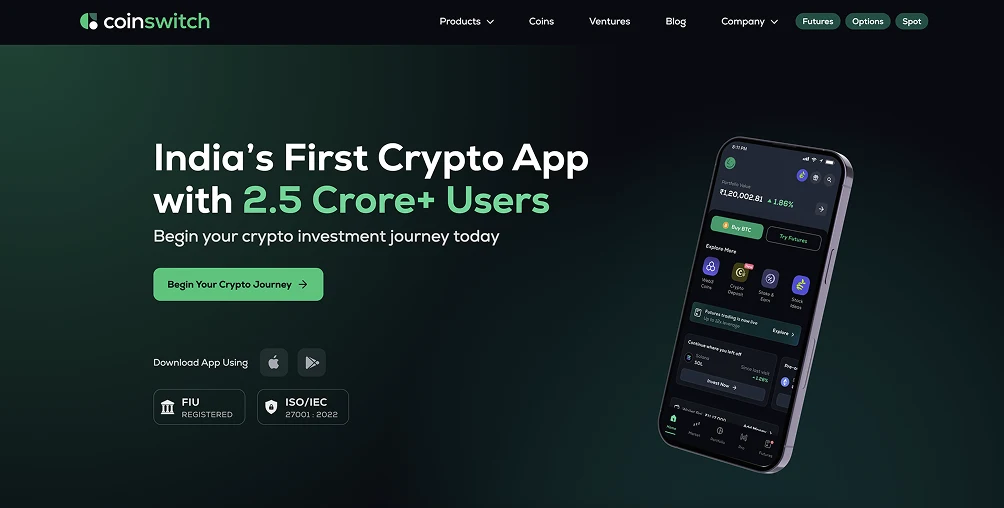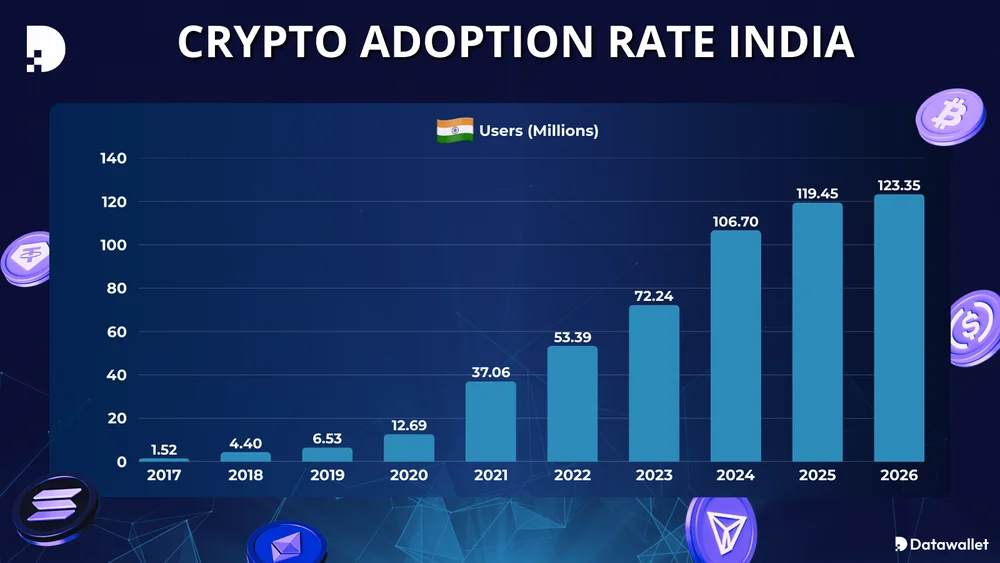6 Best Cryptocurrency Exchanges in India
.webp)
Summary: Crypto trading is legal in India, but not legal tender. Exchanges must register with FIU-IND under the PMLA and follow strict KYC and AML rules. The most reliable platforms enable INR deposits through UPI, IMPS, NEFT, RTGS, or cards, and provide audited proof-of-reserves, along with support in English and regional languages.
Investors also face a 30% tax on gains and a 1% TDS on transfers, making compliant platforms and precise record-keeping critical. Here are the six best crypto exchanges in India for 2025:
Bybit is the best choice in India because it is FIU-IND registered, processes over $40 billion in daily volume, offers 2,000+ assets, and provides safe staking services.
Fees
0.1% Trading Fees
Available Cryptos
2,000+ Cryptocurrencies
INR Deposit Methods
UPI, Bank Transfers, PayTM & More
Best Crypto Trading Platforms in India
For Indian investors, the key factors when choosing a crypto exchange are regulatory compliance, fund security, and trading costs. Top platforms support INR deposits through UPI, IMPS, NEFT, RTGS, debit and credit cards, and approved payment gateways.
Exchanges should list a wide range of assets, maintain audited proof-of-reserves, and offer reliable customer support in English and regional languages. Registration with the Financial Intelligence Unit of India (FIU-IND) and strict KYC/AML checks are essential to reduce legal and counterparty risk.
The table below compares leading Indian cryptocurrency exchanges by fees, INR deposit methods, asset availability, and core features:
1. Bybit - Most Trusted Exchange in India
Bybit is a leading choice for Indian investors, combining deep liquidity, low fees, and a broad product range. Founded in 2018, it records more than US$40 billion in daily trading volume and accepts INR deposits through UPI, IMPS, RTGS, Paytm, Digital E-Rupee, debit cards, and credit cards, giving traders direct access to global markets.
The platform lists over 2,000 cryptocurrencies for spot trading and supports 400+ perpetual and futures contracts with leverage up to 200x. Active traders benefit from advanced tools such as copy trading and portfolio analytics, while Bybit Earn enables staking, lending, and liquidity mining. The Bybit Card extends utility by allowing everyday spending with cashback rewards.
In India, Bybit is registered with the Financial Intelligence Unit of India (FIU-IND) and fully compliant with AML and KYC requirements. This ensures a secure and regulated environment for investors while offering competitive global trading conditions.
Platform Highlights:
- Fees: Spot trading from 0.1%
- Supported Assets: 2,000+ cryptocurrencies
- Regulation & Licensing: FIU-IND registered; AML/KYC compliant
- INR Deposit Methods: UPI, IMPS, NEFT, RTGS, debit and credit cards, Google Pay, Apple Pay and more

2. BloFin - Best Exchange in India Without Mandatory KYC
BloFin appeals to Indian traders by allowing accounts without compulsory KYC, enabling fast access while maintaining security through regular proof-of-reserves updates. For users who value speed and privacy, this optional verification model is a clear advantage.
The platform lists over 600 cryptocurrencies across spot and derivatives markets, with strong BTC/ETH liquidity and active altcoin pairs. It also offers coin- and USDT-margined contracts and Earn products with fixed or flexible yields.
Traders can use Copy Trading with transparent performance data and automation tools like grid, DCA, signal, and TWAP bots. The drawback is regulatory risk, as BloFin operates offshore without FIU-IND registration, making it better suited to experienced users willing to trade without formal protections.
Platform Highlights:
- Fees: Spot trading from 0.1%–0.2%
- Supported Assets: 600+ cryptocurrencies
- Regulation & Licensing: Not licensed in India; optional KYC
- INR Deposit Methods: Bank cards and third-party processors

3. Binance - Best for Liquidity and Global User Base
Binance is the largest cryptocurrency exchange and a leading option for Indian investors who value liquidity and low fees. With more than 270 million users and billions in daily turnover, it offers unmatched depth on major pairs like BTC/USDT, ETH/USDT, and SOL/USDT, ensuring quick execution and minimal slippage.
Indian users can fund accounts in INR through the Binance P2P marketplace, which enables zero-fee conversions with verified counterparties. This peer-to-peer system remains the most reliable way to move between rupees and stablecoins given local banking restrictions.
The platform offers 500+ cryptocurrencies across spot, margin, and futures, with extras like Earn, Launchpool, auto-invest, and loans. Security includes proof-of-reserves, strict KYC/AML, and 24/7 support, though it is not FIU-IND registered in India.
Platform Highlights:
- Fees: Spot trading from 0.1%
- Supported Assets: 500+ cryptocurrencies
- Regulation & Licensing: Global VASP registrations; AML/KYC compliant but not FIU-IND registered
- INR Deposit Methods: P2P marketplace, Visa, Mastercard

4. CoinDCX - Best Local Exchange in India
CoinDCX is India’s largest domestic exchange, trusted by over 20 million users and reporting quarterly volumes above ₹2.4 lakh crore. It lists 500+ cryptocurrencies and is registered with the Financial Intelligence Unit (FIU-IND), meeting national AML standards. Security is backed by ISO/IEC 27001:2022 certification and third-party proof-of-reserves.
The platform offers spot, margin, and futures trading with free INR deposits and withdrawals through UPI and bank transfers. Investors can also access staking, structured investment products, and automated tax reports, while CoinDCX Learn and DCX Pro provide education and advanced trading interfaces.
CoinDCX is highly compliant and reliable but costs more than global competitors. With maker fees at 0.5% and taker fees at 0.75%, heavy traders often turn to Bybit or Binance for lower costs. CoinDCX suits those who value a fully regulated Indian exchange over cheaper international options.
Platform Highlights:
- Fees: 0.5% maker, 0.75% taker
- Supported Assets: 500+ cryptocurrencies
- Regulation & Licensing: FIU-IND registered; ISO/IEC 27001:2022 certified
- INR Deposit Methods: UPI, bank transfers, debit and credit cards, Paytm

5. OKX - Strong Overall Alternative in India
OKX blends a centralized exchange with a full Web3 ecosystem, giving Indian traders both liquidity and decentralized access. Its markets cover spot and derivatives with deep order books, TradingView charts, copy trading, and grid bots for automation.
The OKX Wallet supports 130+ networks for storage, swaps, staking, bridging, and dApp access. Its DEX aggregator pulls liquidity from 400+ decentralized exchanges, splitting orders for best pricing and lower slippage. Users can run MEV-protected swaps, track on-chain activity, and toggle between simple or advanced modes.
Institutions gain high-throughput APIs and reporting, while retail users benefit from a polished mobile app and INR on-ramps through bank cards and third-party processors. Though not FIU-IND registered, OKX follows global AML and compliance practices.
Platform Highlights:
- Fees: Spot maker from 0.08%, taker from 0.1%
- Supported Assets: 350+ cryptocurrencies
- Regulation & Licensing: Global compliance; not FIU-IND registered
- INR Deposit Methods: Bank cards, third-party processors

6. CoinSwitch - Best Indian Alternative to CoinDCX
CoinSwitch is India’s most popular crypto app, trusted by over 25 million users with lifetime trading volumes above ₹8.7 lakh crore. It lists more than 350 cryptocurrencies and is registered with the Financial Intelligence Unit (FIU-IND). Security is strengthened through ISO/IEC 27001:2022 certification and insured custodial storage.
The platform is built for accessibility, allowing INR deposits from as little as ₹100 through UPI, bank transfers, and cards. Traders have access to spot, futures, and options markets, alongside features like systematic investment plans, staking, and SmartInvest products. Education resources and automated tax reports simplify the process for new investors.
CoinSwitch focuses on ease of use and compliance but charges higher fees and spreads compared to other exchanges. It is best suited for beginners and retail investors who want a straightforward app with reliable INR support and strong security protections.
Platform Highlights:
- Fees: Higher than average; varies by product with spot trading at 0.2%
- Supported Assets: 350+ cryptocurrencies
- Regulation & Licensing: FIU-IND registered; ISO/IEC 27001:2022 certified
- INR Deposit Methods: UPI, bank transfers, debit and credit cards

Is Crypto Legal and Regulated in India?
Indians can legally buy, hold, and trade crypto, but it is not legal tender. Since 2022, crypto has been classified as Virtual Digital Assets (VDAs) for tax, with gains taxed at 30% under Section 115BBH and a 1% TDS under Section 194S on transfers. Loss offsets are not allowed, and gifts may be taxable.
Oversight is driven by AML and KYC rules. From March 2023, VDA service providers must register with FIU-IND and comply with the Prevention of Money Laundering Act (PMLA). Non-compliant offshore exchanges have faced fines and website blocks, though some later resumed after registration. India still lacks a dedicated crypto law, and digital assets cannot be used for payments.
The RBI’s 2018 banking ban was overturned by the Supreme Court in 2020, restoring access to banks while affirming RBI’s authority to regulate. Policymakers continue to explore a long-term framework, with SEBI expected to play a role, but no timeline is confirmed.
💡 Regulation Timeline in India
- Apr 2018: RBI orders banks to cut ties with crypto firms
- Mar 2020: Supreme Court overturns RBI ban; banking access restored
- Feb-Jul 2022: Finance Act introduces VDA taxation; 30% tax and 1% TDS begin
- Mar 2023: VDAs brought under PMLA; FIU-IND registration required
- Dec 2023: FIU issues notices, seeks blocks on major offshore exchanges
- May-Jun 2024: Offshore platforms register with FIU-IND, pay penalties
- 2025: Crypto remains legal but not legal tender; full legislation under review
How is Crypto Taxed in India?
In India, crypto is taxed as Virtual Digital Assets (VDAs). Profits from sales are subject to a flat 30% tax under Section 115BBH, plus surcharge and cess. Only the cost of acquisition is deductible, and losses cannot be offset or carried forward. Gifts of crypto may also be taxable under Section 56(2)(x).
A 1% TDS under Section 194S applies on all transfers, deducted by the exchange or payer. Thresholds are ₹10,000 per year (₹50,000 for specified persons). The TDS is credited against the investor’s final tax liability when filing returns.
For businesses, profits are taxed at normal corporate or income tax rates. 18% GST applies on exchange and platform service fees, not the value of crypto itself. Tokens from mining, staking, or airdrops are taxed as income on receipt, with transfers later taxed again at 30%.
💡 Example: Crypto Trade in India
- Profit: ₹2,00,000 from selling BTC
- Tax: ₹60,000 (30%) plus cess
- TDS: 1% deducted at sale, creditable against final liability
Key takeaway: Crypto trades are subject to a 30% tax on profits, a 1% TDS on transfers, and an 18% GST on service fees, making precise record-keeping essential.
Cryptocurrency Adoption Statistics in India
India has one of the world’s largest crypto user bases, driven by retail trading and remittances. Uptake is fueled by cheap smartphones, widespread UPI use, and growing comfort with digital assets. By 2025, more than 100 million Indians are expected to own crypto, with penetration near 7-8 percent.
Market size projections point to multi-billion-dollar revenues in 2025, with modest growth into 2026. Average revenue per user is in the low-$80 range, reflecting steady transaction activity. Adoption extends beyond major cities, showing strong retail interest despite high taxes and regulatory uncertainty.
India Adoption Snapshot (2025–2026):
- Users: 100–120 million; penetration 7–8%
- Revenue: estimated US$9–10 billion by 2025, growing into 2026
- Position: among the top globally for grassroots adoption

How to Buy Bitcoin in India – Step by Step
The most reliable way to buy Bitcoin (BTC) in India is through FIU-IND registered exchanges that comply with KYC and AML standards. Platforms such as Bybit, CoinSwitch, Binance, CoinDCX, and OKX all provide strong liquidity in BTC/INR and BTC/USDT pairs.
- Select an Exchange: Choose a regulated platform operating in India. Check for FIU-IND registration and INR funding support through UPI, bank transfers, or P2P markets.
- Create Your Account: Register with your email or mobile number, then complete KYC using Aadhaar, PAN, or passport. Verified accounts enable INR deposits and withdrawals.
- Deposit INR: Add funds through UPI, IMPS, NEFT, RTGS, debit or credit cards, or P2P trades with verified sellers. Most exchanges offer instant deposits via UPI.
- Buy Bitcoin (BTC): Open the BTC/INR or BTC/USDT market, enter the purchase amount, and confirm your trade. Orders typically settle instantly.
- Secure Your Bitcoin: Transfer BTC to a private wallet after purchase. Hardware wallets such as Ledger and Trezor offer maximum security, while reputable mobile wallets work for smaller, frequent transactions.
Final Thoughts
In India, picking the right crypto exchange means weighing compliance, security, and fees against your trading goals.
FIU-IND registered platforms like CoinDCX or CoinSwitch provide regulatory protection but charge more. Bybit and Binance offer stronger liquidity and lower costs but face regulatory gaps.
A balanced strategy is to use a compliant Indian exchange for INR deposits and withdrawals, pair it with a global platform for deeper markets, and store long-term holdings in a private wallet.
Frequently asked questions
Which Indian banks currently allow crypto exchange deposits?
Major private banks like HDFC, ICICI, and Axis support INR transfers to FIU-IND registered exchanges through UPI and IMPS. Public sector banks remain cautious, and some limit card-based funding. Offshore platforms often rely on P2P markets because direct INR rails are blocked.
Are stablecoins like USDT and USDC available on Indian exchanges?
Yes, FIU-IND registered platforms such as CoinDCX and CoinSwitch list stablecoins including USDT and USDC, though volumes are smaller than on global exchanges. Many traders still prefer offshore platforms for deeper stablecoin liquidity paired with BTC and ETH.
What happened to WazirX in India?
In July 2024, WazirX was hacked for about $230 million after attackers breached its custody systems and laundered funds through token swaps and mixers. The platform ceased operations shortly after the exploit, triggering regulatory probes in India and Singapore. The collapse underscores the importance of using exchanges with audited proof-of-reserves and keeping long-term assets in private wallets.
Can Indian investors access futures or derivatives trading?
Domestic platforms like CoinDCX and CoinSwitch restrict leverage and derivatives to comply with Indian rules. Global exchanges such as Bybit, Binance, and OKX still offer futures and perpetual contracts to Indian traders, but these operate offshore and carry higher regulatory risk.

Written by
Antony Bianco
Head of Research
Antony Bianco, co-founder of Datawallet, is a DeFi expert and active member of the Ethereum community who assist in zero-knowledge proof research for layer 2's. With a Master’s in Computer Science, he has made significant contributions to the crypto ecosystem, working with various DAOs on-chain.

.webp)

.webp)





